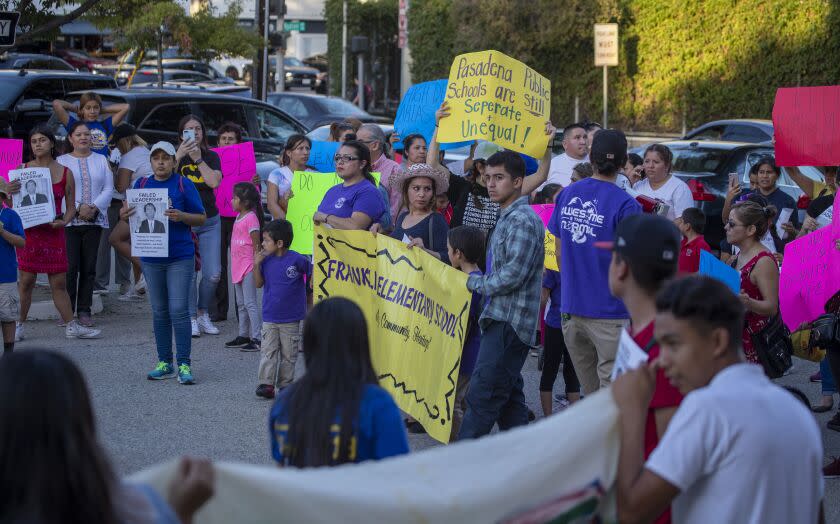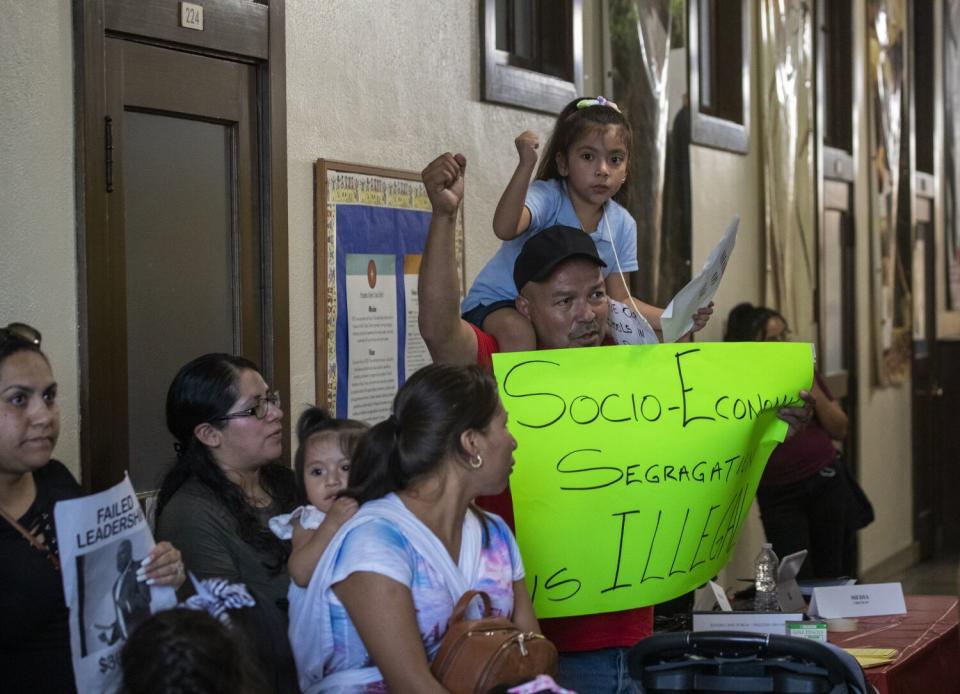Parents, MALDEF sue Pasadena Unified for 2019 school closures, alleging discrimination

The parents of seven Latino elementary school students are suing the Pasadena Unified School District on claims of discrimination after the district’s 2019 closure of three elementary schools with a large Latino enrollment, according to a complaint filed in Los Angeles County Superior Court.
Acting on behalf of the parents, the Mexican American Legal Defense and Educational Fund, a Latino civil rights organization, alleged in the suit that by closing Roosevelt, Jefferson and Franklin elementary schools, the district harmed students and violated their right to an education, guaranteed by the state’s Constitution, according to a MALDEF statement released Wednesday.
Some of the children who were relocated lost access to learning and special education programs at their previous schools, the lawsuit alleges. Some parents said their children’s transfer caused difficulties in transportation, and congestion at pickup and drop-off points due to the influx of students and changes to their work schedules. Several students suffered emotional distress, including depression, and sought therapy, according to the lawsuit.
“PUSD failed to take into account basic racial equity when it decided to close three majority-Latino schools” MALDEF attorney Erika Cervantes said in a statement Wednesday. “PUSD has placed these schools last when it comes to investment in the students’ education. Latino children deserve better, and we’re holding PUSD accountable through this lawsuit for its discriminatory practices.”
The suit seeks a court order for Pasadena Unified to create a new, equitable school closure process that complies with state law.
In a statement provided two days after MALDEF announced its lawsuit, a spokesperson for Pasadena Unified said the legal action is "meritless" and that the district is committed to creating an equitable school environment.
"Not only did the school closures not disparately impact Latino students, but the District did not target Latino-majority schools for closure," the statement said. "In light of the fact that PUSD is a majority Latino district and that PUSD’s student population in 2019-2020 was 60% Latino, any school closures would disproportionately impact Latinos based simply on the demographics of our student population."
The district added that it believes students from the closed schools are receiving a high-quality and equitable education.
"We continue to stand tall with all our families to ensure that all children, regardless of their background, learn and grow so that they can be ready to succeed in college and careers.”

In fall 2019, the school board debate on school closures drew community protests.
The three schools that closed and the scampuses that received the influx of new students from those schools enrolled a majority of Latino students, according to the lawsuit. None of the closed schools were in the eastern part of the district, which has a higher percentage of white students. The district considered but chose not to close two schools with declining enrollment that had a lower percentage of Latino students, the lawsuit alleges.
Of the shuttered campuses, Franklin Elementary School was 76% Latino, Jefferson was 86% and Roosevelt school was 88% during the 2019-20 school year, according to the lawsuit, which cites data from the state Department of Education.
The district closed the campuses because of low enrollment, though Jefferson Elementary's enrollment increased before its closure, from 382 students in the 2017-18 school year to 409 in the 2019-20 school year.
Pasadena Unified has 14,542 students based on the most recent attendance figures provided by the state, which are from the 2021-22 school year. That’s down from 16,881 in the 2017-18 school year.
Overall, the school system is 57.8% Latino, 19.1% white, 10.5% Black and 5.2% Asian. About 13.8% of students are learning English; for about 90% of these students, their first language is Spanish. About two-thirds of students belong to families with income low enough to qualify for free or reduced-price meals at school.
"Undoubtedly, PUSD's targeted and deliberate closures send a clear message: To be Latino is to be stripped of your right to an equal education," the lawsuit states.
Ernest Herrera, a MALDEF attorney, said Thursday that the pandemic-forced distance learning made it difficult to assess how the school closures affected families. But once students were back for in-person learning, he said, the alleged disparities emerged.
"We seek a fair determination of which schools should be closed in PUSD," Herrera said. "Such a determination would close schools where students are most prepared and families most equipped to adjust successfully to a closure. The opposite occurred here; schools were selected with substantial numbers of poorer students, English learners, and students with disabilities — the students likely to face the greatest difficulty adjusting to a closure. PUSD seemed to base its decision on which parents were most likely to complain, rather than on student needs.”
The suit described some of the education hardships that parents say their children have experienced.
One second-grade student, the child of plaintiff Luz Becerra, has osteoporosis and uses a wheelchair. Becerra and the student live walking distance from his original school, Roosevelt Elementary, which was designed to accommodate children who require wheelchair access. The child was transferred to Willard Elementary, five miles away. As Becerra does not drive, she found difficulties in transporting her child to school, the suit alleges.
A third-grade student was moved from Franklin Elementary to Altadena Elementary and had trouble adjusting to his new environment. The child “experienced thoughts of suicide, depression and loneliness” and was placed in therapy, the suit alleges.
The lawsuit further alleges that parents were not given proper notice of the closures; notification came just a week before the closures were formally approved by district officials.
Pasadena Unified countered those allegations in its statement, saying that the district followed a transparent and inclusive process in deciding which schools to close, which included creating a task force of parents, staff and community members who made recommendations to its board.
The board convened its own subcommittee to make recommendations to the full body in a process that took nearly two years, the district said in a statement.
"It is always painful when a community is forced to close schools and PUSD’s decision to close four schools was no exception," the statement said. "That District administration and the Board of Education would make school closure decisions based upon the ethnic makeup of particular schools is simply preposterous."
Times staff writer Howard Blume contributed to this report.
This story originally appeared in Los Angeles Times.

